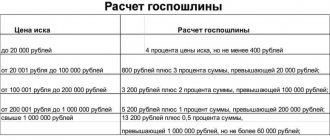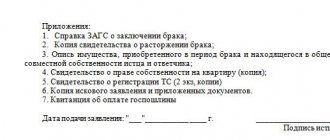Home/Division of property/At a notary
As a general rule, property received by a husband and wife during marriage is recognized as joint. However, spouses can divide property during marriage or divorce by contacting a notary. The specialist only certifies the will of the husband and wife. Initially, a married couple must independently distribute property among themselves by drawing up an agreement. The document must not contradict the law. In order for a notary to agree to certify an agreement on the division of property, spouses must follow a number of rules when filling out the agreement. In order for the procedure for dividing the property of husband and wife in a notary office to take place quickly, it is worth reading this article.
Attention! If you have any questions, you can chat for free with a lawyer at the bottom of the screen or call Moscow; Saint Petersburg; Free call for all of Russia.
What is division of marital property?
When purchasing property during marriage, a married couple uses funds from the common budget.
Both spouses bear the costs. The purchased property is also in most cases used jointly or to ensure the interests of the husband and wife. The spouses lead a common life, live together, and raise children. Features of the use of property purchased during marriage are reflected in legislation. All property acquired by a husband and wife is recognized as joint (Article 34 of the RF IC). It does not matter to whom exactly the purchase and sale agreement for a particular property is drawn up. Attention
If joint ownership of the common property of the spouses does not suit the husband or wife, the property can be divided by a notary (Article 38 of the RF IC). This does not require a divorce. The division of property by a notary is a procedure during which the common property of the spouses is transferred to the division of private or shared property, taking into account the interests of the husband or wife. Simply put, each of the participants in the marriage will receive a share or a specific piece of real estate, which they can dispose of at their personal discretion.
How is property divided in marriage and divorce?
More than 50% of marriages break up: Rosstat calculated* that for every 1000 marriages there are 583 divorces.
*Data source: report for 2021, published on the Rosstat website.
But the need to divide family property arises not only during divorce, but also:
- married;
- some time after the divorce;
- when a creditor demands the sale of the debtor’s property to pay off the debt;
- in case of bankruptcy of an individual a person who is married.
The principle of division of property is the same: all jointly acquired property is divided equally (Article 34 of the RF IC). But it’s so easy only in theory. In practice, division of property is one of the most difficult categories of litigation.
Let's understand the nuances of dividing family** property, including real life examples.
** When we talk about family property, we mean property acquired during a registered marriage. An unofficial marriage does not lead to legal consequences. Even if a man and woman have lived together for many years and have children, the concept of jointly acquired property does not apply to such relationships. To whomever a particular item is registered, it remains with him. An exception is shared ownership (Article 244 of the Civil Code of the Russian Federation): it is divided in proportion to the size of the shares.
However, even in the case of an unregistered marriage, there is a chance that the court will divide the property fairly. You just need to prove the fact of long-term cohabitation and your participation in the purchase of property registered in the name of your cohabitant. Most likely, you will need a good lawyer.
What property is divided and what is not divided?
What property is divided:
- Income, including pensions and benefits
- Real estate
- Cars
- Appliances
- Money cash, money on cards
- Shares and other securities
- Luxury items, etc.
Property that is not divided:
- Property given to one of the spouses
- Inherited property
- Property purchased before marriage
- Property acquired after divorce
- Personal items: wardrobe items, jewelry
- Property acquired during separate residence
- Belongings of minor children
- Deposits opened for children under 18 years of age
Note:
“Indivisible” property can be recognized as common and divided. One spouse may claim a share of the other spouse's personal property. To do this, it is necessary to prove, based on facts, documentary evidence and testimony, that during the marriage the value of the property increased due to the contribution of family or personal funds to it, as well as the labor of that non-owner.
Here's an example:
I want to divide “indivisible” property, I need the help of an expert
Ask a Question
The wife inherited the house. Over the years of marriage, the house was completed, renovated and furnished. As a result, the value of the house increased. The court recognized the housing as joint property and awarded a share to the husband, taking into account the amount of invested funds (1).
1) Appeal ruling of the Volgograd Regional Court dated March 28, 2014 No. 33-1457/2014
What are the ways to divide the property of a husband and wife?
From the provisions of Article 38 of the RF IC it follows that there are two ways to divide the property of spouses: through the court or a notary. First of all, the husband and wife need to identify the existence of differences. If there is no dispute, the married couple must independently divide the property and draw up a voluntary agreement. The finished official paper is subject to notarization (clause 2 of Article 38 of the RF IC). The specialist checks documents for compliance with legal requirements.
IMPORTANT
The division of the jointly acquired property of a husband and wife is carried out in court if there is a dispute (clause 3 of Article 38 of the RF IC). The representative of the authority will determine what property belongs to each of the spouses. If the property cannot be divided, the husband or wife who did not receive a share will be able to claim compensation for the value of the property.
Normative base
The possibility of dividing the property of spouses through a notary is mentioned in Article 38 of the RF IC. However, the legal act states that the specialist does not independently divide the property. Spouses can prepare a voluntary agreement on the division of property. The document must describe the specifics of the distribution of property between husband and wife. The information reflected in the agreement must not contradict the law. In particular, it is worth considering the following provisions of the Family Code of the Russian Federation:
- Article 34. Determines the list of real estate objects that are recognized as the joint property of husband and wife.
- Article 36. Describes what kind of property is recognized as individual and cannot be divided on the basis of a notarized agreement.
- Article 37. Determines the rules for recognizing objects purchased by a husband or wife as joint property of the spouses.
- Article 39. Determines the specifics of distribution of shares. The legal act states that, as a general rule, spouses receive an equal amount of property. However, it is permissible to distribute objects according to a different principle if the husband and wife are voluntarily ready to take such measures.
Voluntary agreement or prenuptial agreement
- A prenuptial agreement can be concluded before marriage and during marriage. If drawn up before marriage, it comes into force after receiving the marriage certificate.
The agreement is drawn up during marriage and after divorce. Comes into force according to the conditions specified by the parties in the agreement.
- The marriage contract is concluded in relation to existing property and the future.
The agreement specifies only the property available at the time the agreement is signed.
- Rights and obligations in a marriage contract are limited by a period or the occurrence/non-occurrence of certain conditions.
The agreement on the division of property is indefinite.
- By marriage contract, spouses have the right to change the regime of joint ownership
The agreement cannot change the property regime established by law.
- The prenuptial agreement allows for a generalized title to the property.
The agreement contains strict requirements for the listing and description of items.
- A description of the debt obligations is not required in the agreement.
The prenuptial agreement describes all debt obligations.
When do you need to formalize the division of marital property with a notary?
Husband and wife have the right to distribute property during marriage. It is also possible to divide property during a divorce (Article 38 of the RF IC). Either spouse can offer to prepare a voluntary agreement for the division of property with a notary. The document is drawn up only if there is mutual consent. If one of the spouses opposes it, or disputes arise during the preparation of the agreement, distribution of property through a notarial procedure is impossible. The division of property will take place in court (Article 38 of the RF IC).
Attention
If the husband and wife divorce, the distribution of common property must be completed within 3 years. However, the statute of limitations for the division of property (if we are talking about the judicial division of real estate) begins to be calculated from the moment of violation of the rights of one of the spouses. With a notary, a husband and wife can distribute property after a divorce indefinitely. If the spouses were able to come to an agreement and continue to use the property together without hindrance, the division of property need not be carried out.
What is a settlement agreement?
A settlement agreement is a bilateral document signed by a husband and wife (guardian/legal representative of the incapacitated spouse) that resolves disputed issues by seeking a mutually beneficial compromise. The following principles of document design should be taken into account:
- drawn up during the divorce process or after its completion (division of property of the spouses);
- subject to notarial approval;
- signed only by mutual consent;
- has the highest legal force;
- may concern only certain controversial issues (unaccounted issues will be resolved by the court at its own discretion);
- validity period – full fulfillment of the stipulated conditions by the participants;
- implementation of the agreement begins only after its acceptance by the court.
A couple who has begun a divorce can include in the contents of a settlement agreement issues regarding children (alimony, establishment of guardianship, determination of place of residence, approval of a schedule of meetings with a separate spouse, alimony), property conflicts (division of common material assets), maintenance of a woman after divorce ( alimony, payments to an incapacitated spouse).
The agreement can only be signed with the mutual desire of both participants. Otherwise, the agreement will be declared invalid. It is necessary to strictly follow the procedure and follow the principles of protecting the interests of participants.
Pros and cons of a divorce settlement agreement
Table No. 1 “Advantages and disadvantages of the agreement”
| Behind | Against |
| Reducing the time frame for judicial review of disputes | Mutual search for compromise, when participants have to give in to each other |
| There is no need to involve lawyers and lawyers at the court hearing | There is no guarantee that the court will accept the terms of the agreement (there are few reasons for refusal) |
| Independent determination of ways to resolve conflicts that arise | There is a risk that the contract will be invalidated |
| Resolving a conflict peacefully prevents future disputes |
As practice shows, spouses avoid concluding an agreement, hoping that during the trial they will be able to extract much more from the second party. This is wrong. During the division of property, courts in 90% of cases distribute material assets in half, regardless of the presence of common minor children.
Children are handed over to the mother in 4 out of 5 controversial situations. The schedule of communication between a child and a parent living separately is drawn up based on the busyness of the participants, so this turns out to be too little.
Notary services on the division of property of spouses
The notary works in compliance with the provisions of Law No. 4462-1 of February 11, 1993. If a husband and wife turn to a specialist with a request to divide property, the main task of the representative of the authority is to certify the completed agreement (Article 38 of the RF IC). First, the notary will check the agreement on the division of property of the spouses for compliance with current regulations. If errors are identified, the specialist will return the documents previously accepted for consideration and ask the husband and wife to correct the inaccuracies. Additionally, the notary can:
- help spouses prepare the text of an agreement on the division of property;
- perform typing and printing of documents;
- request the necessary documentation;
- contact the registration authorities on behalf of the spouses.
Additional services provided by a notary during the division of spouses' property are paid separately.
What property of spouses is subject to division by a notary?
Spouses can divide all joint property from a notary (Article 38 of the RF IC). At the legislative level, property that a husband and wife acquired during marriage is considered joint. A complete list of property subject to division by spouses at the notary is given in Article 34 of the RF IC. The list includes:
- income from any activity;
- pensions, benefits, payments that do not have a designated purpose;
- movable and immovable property;
- deposits, shares, shares;
- securities;
- other property acquired during marriage.
In this case, it does not matter which member of the couple has entered into a purchase and sale agreement or has opened an account with a banking organization. In practice, one of the spouses can do housework or care for children. This does not deprive the husband or wife of the right to joint property, even if the participant in the marriage had no income. Good reasons that do not allow a spouse to carry out work activities may also be taken into account (Article 34 of the RF IC).
However, not all property of spouses is recognized as jointly acquired property. Part of the property of a husband and wife is not subject to division by a notary. The following is recognized as the personal property of each spouse (Article 36 of the RF IC):
- real estate objects owned by a husband and wife before the official registration of family legal relations;
- property received as a gift by a husband or wife during marriage;
- property inherited by a specific spouse;
- a piece of real estate obtained as a result of a gratuitous transaction;
- things for individual use, even if they were acquired from the common funds of the spouses;
- rights to the results of intellectual activity.
Attention:
The exception is jewelry and luxury items (Article 36 of the RF IC). This category of property is recognized as the joint property of the spouses and is subject to division by a notary or through the court.
It is also worth noting that if a married couple has drawn up a marriage contract, then this document establishes provisions on who will receive this or that property in the event of divorce, and accordingly, the division of the property of the spouses at the notary is carried out in this order.
Division of property during divorce. Is it that simple? Let's figure it out
In this article I would like to consider some of the nuances of dividing the property of spouses (or a spouse) during a divorce. It would seem that judicial practice is so extensive that everything here is quite clear. But, after analyzing a number of cases, I came to the conclusion that spouses do not always and do not fully know their rights and the immediate specifics of the property division process... let's try to figure it out.
Unfortunately, in recent years the institution of marriage has suffered from a whole range of problems. Perhaps divorce is the main one. Fortunately, it is not a lawyer’s task to analyze the reasons for this fact, but we need to better understand how to work with this, how to interact with the client in a given situation, especially considering his sometimes difficult psychological situation in this category of cases.
1) First of all, let us highlight what may be the common property of the spouses and, accordingly, subject to division. In accordance with Art. 37 of the RF IC, the property of each spouse can be recognized as their joint property if it is established that during the marriage, investments were made at the expense of the common property of the spouses or the property of each spouse, or the labor of one of the spouses, significantly increasing the value of this property. Based on Art. 39 of the RF IC, when dividing the common property of spouses and determining shares in this property, the shares of the spouses are recognized as equal, unless otherwise provided by the agreement between the spouses.
For a broader approach to understanding the problem, let us turn to judicial practice. Clause 15 of the Resolution of the Plenum of the Supreme Court of the Russian Federation dated November 5, 1998 No. 15 “On the application of legislation by courts when considering cases of divorce” states that the common joint property of the spouses, subject to division, is any movable and immovable property acquired by them during the marriage property that, by virtue of Articles 128, 129, paragraph 1 and Article 213 of the Civil Code of the Russian Federation, can be the object of ownership rights of citizens, regardless of which spouse it was acquired in the name of or funds were contributed to, if the marriage the agreement between them does not establish a different regime for these objects. The common property of the spouses includes, inter alia, real estate acquired at the expense of common income and any other property acquired during the marriage, regardless of the name of which of the spouses it was acquired or in the name of which or which of the spouses contributed funds (Part 2 Article 34 of the RF IC). According to Part 1 of Art. 36 of the RF IC, property that belonged to each of the spouses before marriage, as well as that received by one of the spouses during marriage as a gift, by inheritance or through other gratuitous transactions, is his property.
Let's return to Art. 37 of the RF IC, which states that the property of each of the spouses can be recognized as their joint property if it is established that during the marriage, investments were made at the expense of the common property of the spouses or separately of each of the spouses, or the labor of one of them, significantly increasing the value this property...of course, it is worth understanding what improvements can be considered inseparable by the legislator and the courts. Within the meaning of clause 3 of Art. 245 of the Civil Code of the Russian Federation, inseparable improvements that entail a change in the ratio of shares include an increase in the usable area of buildings, as well as the replacement of basic structural elements, which entails a significant increase in the cost of the facility as a whole. In relation to residential buildings, inseparable improvements that entail a change in the size of shares in the right of common ownership of these real estate objects, as a rule, mean that one of the owners carries out work to increase the usable area of the residential building. The court is guided by the value of the property before and, accordingly, after the changes made. Perhaps this position is quite clear, but practice makes it clear that when filing a claim, one of the parties often does not quite understand what those inseparable improvements are and tries to claim almost the property as a whole. Here it is very important to differentiate simple household assistance, a minimal contribution from significant improvements. Our task as lawyers is to convey this information to clients in the most intelligible and understandable way, helping to separate what they could really claim from this or that object for which their claims are not at all justified.
2) MORTGAGE
Let’s imagine a case that is quite popular in practice, when one of the spouses provides certain funds to pay off the mortgage loan when paying the down payment. This example is taken from a real court case. The husband’s demands to recognize the funds paid to his wife as a down payment for an apartment as jointly acquired property, to determine the shares of the spouses as equal and to impose on her the obligation to pay half of the specified amount are not subject to satisfaction due to the fact that a marriage contract was concluded between the spouses, under the terms of which the parties determined that the apartment, which will be purchased using credit funds, after concluding this agreement in the name of the spouse, both in marriage and in the event of divorce for any reason, will be the separate property of the spouses and will be considered the property of the wife. The obligations under the loan agreement provided for the purchase of the above-mentioned apartment in the name of the spouse by the bank are in full their personal obligations. In defense of the court’s reasoning, it is worth noting that the legislator in Art. 42 of the RF IC provides spouses with the opportunity to change the legal regime of property to contractual by marriage contract, establishing a regime of separate ownership in relation to property registered in the name of one of the spouses. Also, a regime of common (shared or joint) ownership may be established in relation to the property of each spouse.
According to paragraph 15 of the Resolution of the Plenum of the Supreme Court of the Russian Federation of November 5, 1998 No. 15 “On the application of legislation by courts when considering cases of divorce,” if the marriage contract changes the statutory regime of joint ownership, then the court, when resolving a dispute about the division of property of the spouses, must be guided by the terms of such agreement. It should be borne in mind that, by virtue of paragraph 3 of Article 42 of the Family Code of the Russian Federation, the terms of the marriage contract on the regime of joint property, which put one of the spouses in an extremely unfavorable position, are considered invalid. Thus, the exercise by spouses of the right to determine the regime of property and disposal of common property by concluding a marriage contract should not put one of the spouses in an extremely unfavorable position, for example, due to a significant disproportionality of shares in the common property or the deprivation of one of the spouses completely of the right to property acquired in period of marriage. In this case, it appears that the court made an absolutely lawful and legal decision. From the above it follows that a notarized marriage contract is an act that changes the legal regime of the spouses’ property.
The terms of the concluded marriage contract do not provide for any monetary compensation for the funds invested in the acquisition of property to the second spouse. The plaintiff’s arguments in the initial claim that the spouse has the right to half the money from the amount of the down payment made by him under the purchase and sale agreement for the property are not accepted by the court, since they are based on an incorrect understanding of the law and an incorrect interpretation of the terms of the concluded marriage contract.
3) LIMITATION PERIOD
Finally, I note that according to paragraph 19 of the Resolution of the Plenum of the Supreme Court of the Russian Federation previously mentioned in the article, the three-year limitation period for claims for the division of property that is the common joint property of spouses whose marriage is dissolved should be calculated not from the time of termination, but from the date when a person learned or should have learned about a violation of his right. Here the legislator uses the standard construction of the limitation period as a general rule. But subjects of these legal relations should understand that the moment when a person “learned or should have known about a violation of his right”, as a rule, occurs earlier than the divorce process, which is sometimes a key factor in protecting one’s own rights.
If you have any questions, we are ready for an active discussion. If you need legal assistance on an issue that interests you, we will be happy to provide you with all the necessary information and advice. Just call or WhatsApp us at +7 905-766-17-36 or email danielbotvinnik @ gmail . com
Required documents
The notary must ensure that the property to be divided actually belongs to the spouses and was acquired during marriage. Therefore, the husband and wife must provide the appropriate package of documents. The list of official papers is not fixed in the current legislation. The list of documents may vary depending on the type of property to be divided by the spouses at the notary. If it is necessary to differentiate the rights of a husband and wife to a real estate property, you will need:
- purchase and sale agreement, share participation agreement or other papers confirming the fact of purchase of an apartment or house;
- extract from Rosreestr;
- cadastral and technical passport.
The given list of documents is not exhaustive. The notary may request additional documentation from the spouses when dividing property, if it is necessary to clarify any data. When movable property is subject to division, the following papers may be required:
- contract of sale;
- checks and receipts;
- technical certificate.
Please note
Regardless of the type of property, the husband and wife must provide the notary with an identification document and a pre-filled agreement on the division of property. If spouses are afraid of making a mistake when preparing documents, you can contact a specialist at a notary’s office in advance and use the service of filling out the document.
Settlement agreement between spouses in court proceedings
If the spouses have already filed a lawsuit for the division of property, then they do not lose the right to conclude a peace agreement. However, there is one significant difference from voluntary agreements signed out of court. A settlement agreement on a claim for divorce does not exempt spouses from paying state fees, which are calculated depending on the cost of the lawsuit. The amount is sometimes calculated in tens of thousands of rubles, but by law cannot exceed 60 thousand rubles.
If you draw up a settlement agreement in case of divorce during court proceedings, then notarized confirmation of the agreement will not be required - the judge hearing the case directly acts as a representative of the law.
As practice shows, the best option for divorcing spouses is to draw up a divorce settlement agreement and not file a claim unless absolutely necessary. Such a decision will not only allow you to preserve your human dignity and nerve cells without having to sort things out in the presence of a judge, but will also give the former spouses a chance to maintain peaceful, civilized relations, if only for the sake of the peace of mind of their common offspring.
Agreement on the division of property of spouses with a notary
Unlike the courts, the notary will not independently deal with the division of the spouses’ property. The husband and wife must distribute the property between themselves. The specialist will only certify the completed agreement on the division of property (Article 38 of the RF IC). The rules for preparing a document are not legally established. However, the agreement must not contradict existing standards and be drawn up in accordance with the general rules of office work.
The only mention of the form of an agreement on the division of property with a notary is found in Article 161 of the Civil Code of the Russian Federation. The legal act states that the document must be drawn up in writing if the cost of the object exceeds 10,000 rubles.
The agreement on the division of property of spouses with a notary must reflect the following mandatory information:
- information about spouses;
- marital status of the parties;
- the purpose of preparing the document;
- a list of property transferred to each of the spouses;
- detailed description of each of the objects;
- date and place of preparation of the agreement;
- moment of gaining legal force;
- signature of each spouse with transcript.
Information is recorded on standard A4 sheets. Typically, a document is drawn up on a computer and then signed by hand. An agreement on the division of marital property with a notary may take several pages. In this case, each page is signed and then stapled. The action is performed to prevent the loss of sheets. Property must be specified as much as possible. Generalized concepts cannot be used. To minimize the likelihood of confusion, it is best to prepare a division agreement for each type of marital property.
A sample agreement for the division of an apartment during a divorce can be found
Is it possible for spouses to draw up an agreement on the division of property themselves for a notary?
Article 38 of the RF IC states that an agreement on the division of common property must be notarized. At the same time, the regulatory legal act does not mention that it is the specialist who is required to prepare the document. A husband and wife can draw up an agreement on the division of property themselves for a notary. The requirements for the form of the document are not fixed by law. In fact, the agreement can be drawn up arbitrarily. However, it is necessary to comply with the general principles of office work and specify the property to be divided. If errors are found in the document, the notary will refuse to certify the agreement.
Independent preparation of an agreement on the division of property helps to quickly distribute any jointly acquired property and save spouses money on registration. However, such a document is easy to challenge in court. Therefore, it is better to entrust the conclusion of an agreement on the division of property to a notary.
Cost of an agreement on the division of property with a notary
For certification of an agreement on the division of property by a notary, a state fee is charged. Its size depends on the value of the property to be divided. The amount of payment for notary services is set forth in Article 333.24 of the Tax Code of the Russian Federation. Spouses must pay 5% of the contract amount. The minimum state duty is 300 rubles, and the maximum is 20,000 rubles. A husband and wife can pay the fee jointly or assign the responsibility for providing funds to only one of the spouses.
For your information
If a married couple wants to use additional services of a notary office, they will need to pay. The amount depends on the list of actions that the specialist will perform. If a notary is entrusted with drawing up an agreement on the division of property of spouses, an additional amount of 10,000 rubles must be provided. The amount varies depending on the place of residence of the spouses. You can find out the price by contacting a notary or visiting the official website of the authority.
How much does it cost to divide property with a notary?
The fundamentals of the legislation of the Russian Federation on notaries dated February 11, 1993 No. 4462-1 completely regulate the activities of notaries. The law provides for only two notarial actions :
- Certificate.
- Witnessing.
Tariffs for performing notarial acts are specified in Art. 22.1 “Fundamentals of the legislation of the Russian Federation on notaries” and Art. 333.24 of the Tax Code of the Russian Federation (since a notary cannot charge more than the established state duty for similar actions performed by officials of executive authorities and local self-government).
The tariff amount and interest rate vary depending on the value of the property specified in the agreement. So:
- If the contract value is up to 1 million rubles inclusive, it will be 0.5% of the contract amount, but not less than 300 rubles.
- From 1,000,001 rub. up to 10 million rubles inclusive will be 5000 rubles. plus 0.3% of the amount over 1 million rubles.
- At a cost of over 10 million rubles. will cost 32,000 rubles. + 0.15% of the amount over 10 million.
- The cost of legal and technical services will be about 4,000 rubles.
In addition to notarial actions, there are also prices for them that are not regulated in any way. Many notaries include in the cost of the service not only the tariff, but also the cost of technical services. Thus, the price is determined by: the tariff + the cost assigned by the notary for legal and technical services.
The procedure for registering the division of property between spouses
If spouses want to divide property by agreement through a notary, they must proceed according to the following scheme:
- Discuss with your husband or wife the fate of all property to be divided.
- Document the agreements reached and prepare an agreement based on the information. You can draw up the document yourself or seek help from a notary.
- Collect papers for property subject to division. Documents must show the date the property was purchased. There may be a need for a real estate appraisal. For this purpose, an independent expert is invited.
- Contact a notary and provide a complete package of documentation. The specialist will check the papers for compliance with legal requirements. If no violations are found, the notary certifies the agreement on the division of property.
- Re-register property. Real estate (Federal Law No. 218 of July 13, 2015) and cars (Federal Law No. 283) are subject to state registration.
State duty
The amount of state duty at a notary when dividing property of spouses is fixed at the legislative level. The amount of the amount is regulated by Article 333.24 of the Tax Code of the Russian Federation. The amount of state duty directly depends on the value of the property. The more expensive the property that is subject to division, the more money the spouses must transfer as a tax fee. The value of the divisible property specified in the agreement is summed up. The state duty is calculated based on the total price of all real estate objects included in the contract (Article 333.24 of the Tax Code of the Russian Federation).
The legislation establishes maximum and minimum fees for dividing property from a notary. Husband and wife must pay at least 300 rubles. The maximum amount of state duty is 20,000 rubles.
Division of spouses' inheritance property at a notary
As a general rule, property received by spouses as an inheritance is recognized as individual property, even if the property was received during marriage (Article 36 of the RF IC). Therefore, the division of such property of husband and wife at the notary is not carried out. Spouses who are not property owners cannot insist on the distribution of the property.
However, the spouse who inherited the property becomes the full owner (clause 4 of Article 1152 of the Civil Code of the Russian Federation) and will be able to fully dispose of the property. A citizen who is an heir can transfer part of the property to his ex-husband or wife. To record the expression of will, a deed of gift is drawn up (Article 572 of the Civil Code of the Russian Federation). As part of the agreement before the notary, property and objects belonging to only one spouse are not divided.
Division of property with a notary, spouses with children
As mentioned earlier, the notary does not independently divide the property of the spouses. The specialist only certifies the agreement (Article 38 of the RF IC). Children do not participate in the division of joint property of their parents. Therefore, the child does not appear in the notarial transaction. Spouses share only their property with the notary, without affecting the property of children. At the same time, the husband and wife set the size of their shares at their own request.
The situation changes when the division of property between spouses and children is carried out through the court. During the trial, the judge will try to take into account the interests of all parties. Children are also no exception. The court will take into account the financial situation of the spouses, take into account who the children are staying with, and then make a final decision. As a result, the size of the shares can be changed in favor of the husband or wife with whom the child will live (Article 39 of the RF IC).
Is it possible to cancel an agreement on the division of marital property with a notary?
A transaction certified by a notary on the division of property of spouses can be declared invalid if certain conditions are met. The list of circumstances allowing such a decision to be made is reflected in paragraph 2 of Chapter 9 of the Civil Code of the Russian Federation.
A notarized agreement on the division of property between a husband and wife can be invalidated in the following cases:
- the document was not prepared in writing (Article 168 of the Civil Code of the Russian Federation);
- the provisions of the document violate law and order and morality (Article 169 of the Civil Code of the Russian Federation);
- the agreement on the division of property was recognized as imaginary (Article 170 of the Civil Code of the Russian Federation);
- one of the spouses is declared incompetent (Article 171 of the Civil Code of the Russian Federation).
Attention
It is possible to cancel an agreement on the distribution of property between spouses only in court. The notary who certified the document will be invited to the process. The court will also agree to terminate the transaction if one of the parties can prove that threats, misrepresentation or violence were used against it (paragraph 2 of Chapter 9 of the Civil Code of the Russian Federation).
How to divide property during bankruptcy
We are often approached by concerned citizens with the question: “What property will be taken away if one of the spouses/ex-spouses is declared bankrupt?”
Today, this issue remains complex, and courts have made conflicting decisions.
So, in case of bankruptcy of a citizen, the personal property of the debtor will first be taken away. But if the total value of such property is less than the debt, then the property acquired jointly during the marriage will “suffer.”
Common property is sold at auction, regardless of whether it is possible or impossible to allocate shares in kind. Part of the money goes to pay off the debt - the debtor's share, part is returned to the “innocent” spouse.
But do not forget that debts are common if the money is spent on the needs of the family. This means that the second spouse’s share can also be taken away. Here it is appropriate to mention the joint bankruptcy of two spouses, which is beneficial for debtors in that it allows them to be freed from all debts and reduce the costs of the bankruptcy procedure by half.
This practice already exists (4), although not all judges agree with it (5).
4) Decision of the Administrative Court of the Novosibirsk Region dated November 9, 2015 in case No. A45-20897/2015 5) Resolution 13-AAS dated February 22, 2021 No. 13AP-2589/2017
So far, judges do not even have a common opinion on which court the division of common property should be submitted to - arbitration or a court of general jurisdiction.
Therefore, if your spouse is bankrupt, it is better to urgently contact bankruptcy specialists so as not to lose property.
There is a danger of losing property
Need expert help
Problems and nuances
In order for a notary to agree to certify a transaction on the division of property, the spouses must visit the authority together. Arriving at the office confirms that the couple made the decision to draw up the document voluntarily. The notary will definitely explain to the spouses the legal consequences of concluding an agreement on the division of property. Only after the specialist is convinced that the husband and wife understand the result of their actions will the document be certified.
The division of property of a husband and wife through a notary is possible. However, the specialist does not have the right to independently distribute the property of the spouses. A notary only certifies a voluntary agreement on the division of property of a married couple, concluded between husband and wife. In the document, the parties must reflect the list of property for distribution and indicate the person who will receive the property. If necessary, a specialist can provide services for drawing up an agreement. The notary does not take into account the interests of children when dividing the spouse’s property and only confirms that the finished draft document complies with the requirements of the law.
Comments Showing 0 of 0
Pre-trial peace agreement
The divorce settlement agreement itself, a sample of which can be found in the public domain, depends on the nuances specified in the document.
A voluntary agreement drawn up pre-trial may include several sections:
- Place of residence of minor children of a married couple after divorce.
- Amount of alimony for the maintenance of offspring. Here you need to indicate the date of transfer of money, the form of payment (cash or money to the mother’s card), the possibility of purchasing clothes and household items for children as monthly payments. The amount of child support depends on the parent's income, as well as the number of offspring he is required to support. According to the rules, the amount of alimony payments cannot exceed half the income of the father or mother, regardless of how many children the citizen has.
- The procedure for raising a son or daughter together - with whom the child will spend vacations, holidays, who will go to parent-teacher meetings, and so on.
- Schedule of visits to offspring by the second parent. When the spouse comes to the child, on whose territory the meetings will take place, is it possible to spend the night with the other parent?
- Payment of alimony to an ex-spouse. This is an optional clause that can be added in specific cases when it comes to a woman’s pregnancy or raising a child under three years of age. Also, alimony payments can be prescribed in a situation where one of the spouses has become disabled as a result of actions aimed at improving the living conditions of the family - for example, while making repairs in the house, the husband fell down the stairs and received a serious injury that does not allow him to work.
- Detailed list and order of division of common goods. If desired, the parties can divide not only what they bought during marriage, but also personal property - for example, a husband can transfer to his wife and children a country house that he inherited from his parents.
- An algorithm for transferring ownership of property after the termination of a marriage relationship to one party or another. For example, spouses can agree that their common apartment will remain in the possession of the husband, and a year after the dissolution of the marriage, he will pay the ex-wife half the cost of housing.









